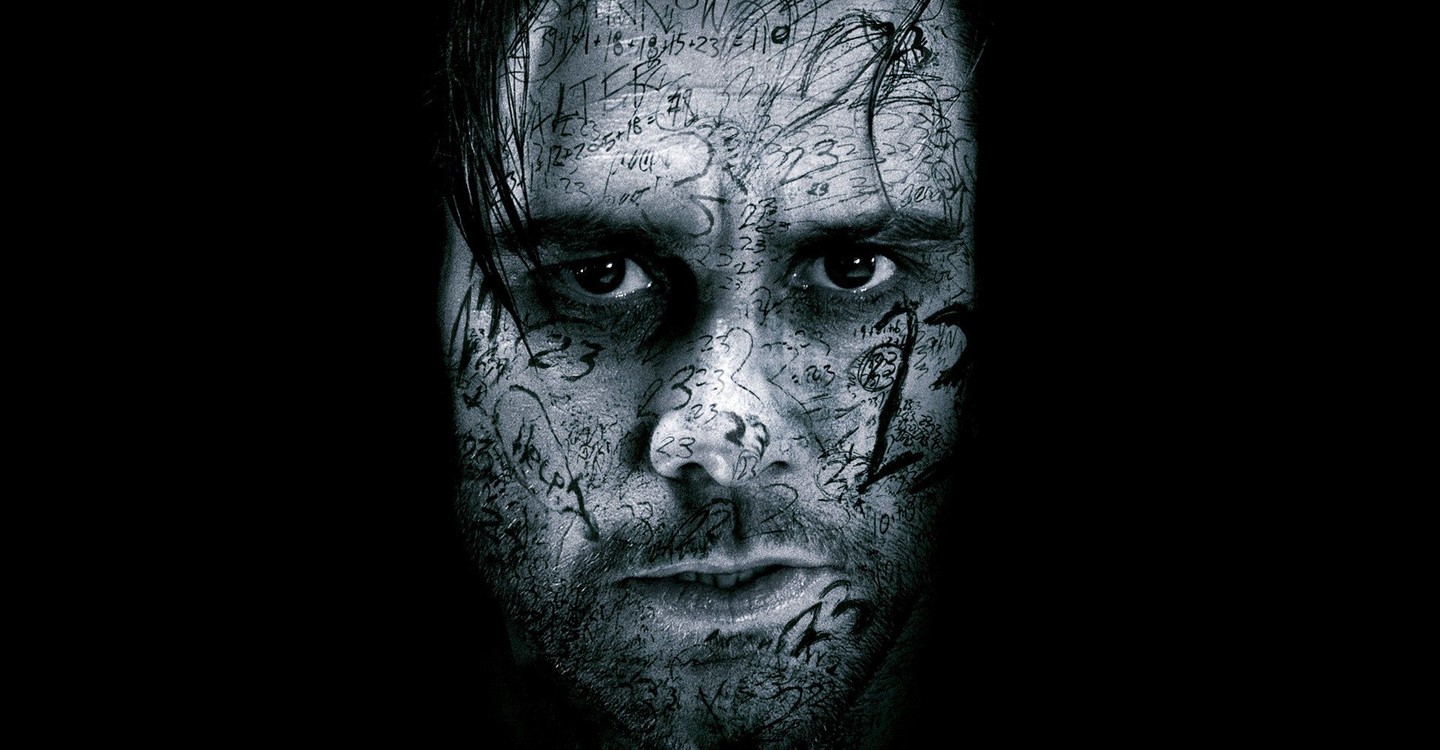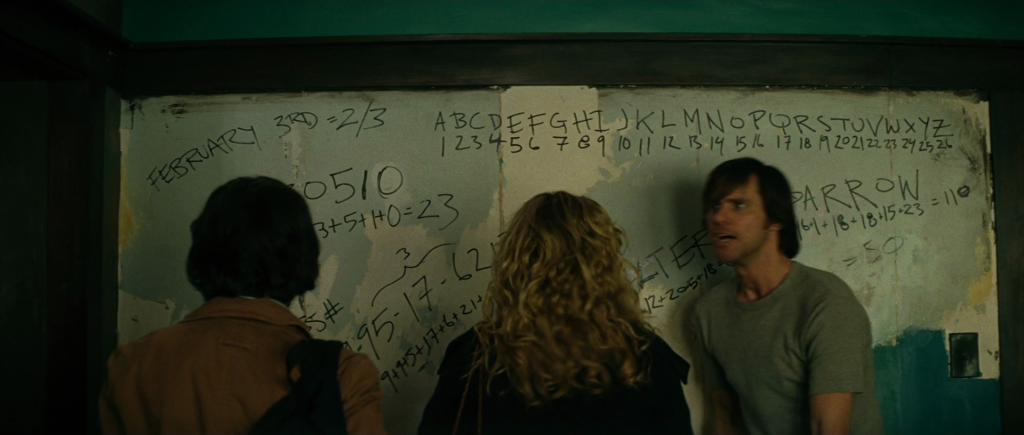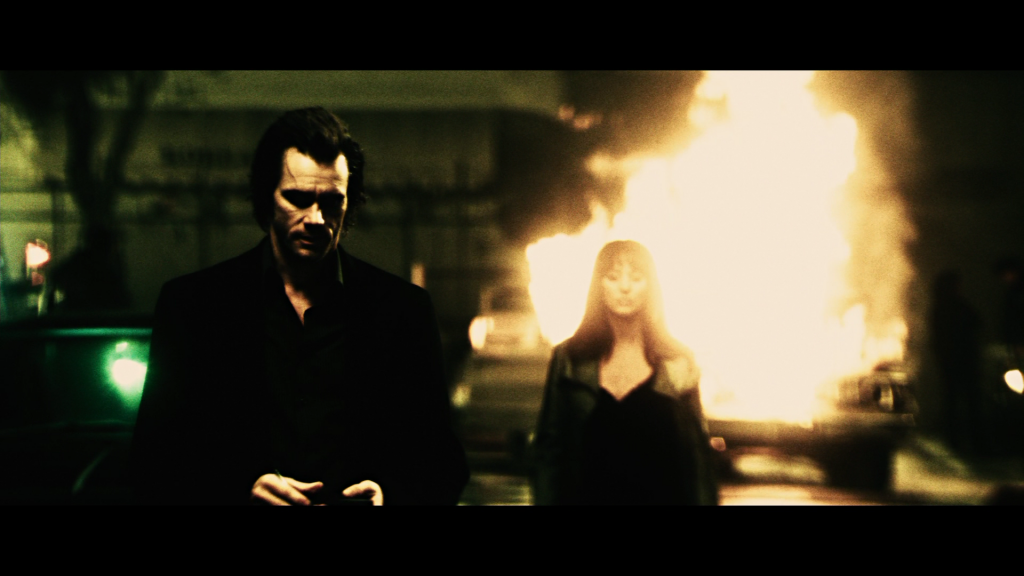Director: Joel Schumacher
Screenplay: Fernley Phillips
Cast: Jim Carrey as Walter
Sparrow/Fingerling; Paul Butcher as Young Walter Sparrow/Fingerling; Virginia
Madsen as Agatha Pink-Sparrow/Fabrizia; Logan Lerman as Robin Sparrow; Danny
Huston as Isaac French/Dr. Miles Phoenix; Rhona Mitra as Laura Tollins
[Some Mild Spoilers]
 I remember The Sun newspaper running a promotional article on this film. To
explain to some readers before we continue, The Sun was a right politic leaning newspaper notorious for the
"Page 3 Girl", female models who'd pose topless in the page,
something they stopped in 20151. The ad for what is frankly a
bizarre proposition for a mainstream Jim
Carrey film ran with the number 23 enigma, explained in that the number had
power in that it could be found in multiple events if you added dates and data together,
such as the date Kurt Cobain of the band Nirvana committed suicide. The Joel Schumacher film itself is entirely
different from this. In fact a debate between Carrey, who becomes obsessed with this number when his wife Agatha (Virginia Madsen) gives him a strange
self published crime novel about this, and Danny
Huston, whose existence is to give monologues as he does here, debate this
in one scene, as if the film itself wants to be more than this premise.
I remember The Sun newspaper running a promotional article on this film. To
explain to some readers before we continue, The Sun was a right politic leaning newspaper notorious for the
"Page 3 Girl", female models who'd pose topless in the page,
something they stopped in 20151. The ad for what is frankly a
bizarre proposition for a mainstream Jim
Carrey film ran with the number 23 enigma, explained in that the number had
power in that it could be found in multiple events if you added dates and data together,
such as the date Kurt Cobain of the band Nirvana committed suicide. The Joel Schumacher film itself is entirely
different from this. In fact a debate between Carrey, who becomes obsessed with this number when his wife Agatha (Virginia Madsen) gives him a strange
self published crime novel about this, and Danny
Huston, whose existence is to give monologues as he does here, debate this
in one scene, as if the film itself wants to be more than this premise.
For me, I'm not particularly
interested in arguing for or against the conspiracy. It's for me, as I have
been obsessed with this film for a long time, more of an argument of the issue
of objective truth, although I am fascinated by details like author William Burroughs being an early
obsessive, recording every incident involving the number. It's surprising how
many examples this film can bring up, and if you look online there will likely
be more. It can be argued a) human beings can find patterns in everything, and
b) some of the mathematical choices in the film, even as someone here who was
always poor at maths, seem contrived in the choices the characters jump to
calculating them. If anything though, if twenty three still appeared at certain
events a lot, let's mimic Danny
Huston's warm and proud vocals inherited from his father John that "twenty
three is a very good number for this", and make it like how lucky number
seven is. Superstition is not just a realm of the mystical and if also happens
to exist even in calculus, it raises questions of how difficult it is to be
able to fully gauge the concept, especially considering it would involve
testing every example in a numerous world where examples would grow ad nauseam.
It is the thing the film is sold
on even in the title, which proves a silly concept especially when Schumacher signals out the number in
signs, as if the number itself is going to start stalking Carrey like a spectre
ready to shank him in the end. The more controversial thing I could say, even
over believing in the enigma, is being an unapologetic Joel Schumacher fan who even likes Batman & Robin (1997), even if it's a gaudy mess. Schumacher is a working director who is
stylish but is dependent on the material being good - when it's not its nipples
on the batsuit and ice puns. The result here, even if I am in the minority, is
a curious hybrid between sincere drama, unintentional comedy, and some good
material.
Jim Carrey at this point in his career is fascinating to consider to,
as the beginning of the film even feels inexplicably like a throwback to his
early career in films like Ace Ventura: Pet Detective (1994), as a dog catcher
in a wacky segment trying to catch a dog. Eventually in the same film he will get
his alter ego Fingerling in that book his character's wife finds for his
birthday, decked out in tribal tattoos, stubble and playing a saxophone in a Sin City-like noir world. Carrey whilst known predominantly as a comedy
did prove his dramatic chops in the late nineties and early 2000s, a film like Eternal Sunshine on a Spotless Mind (2004)
the film many turn to for him being a great dramatic actor. Unfortunately most
of his career had been not as heavy on this or not well remembered, as whilst it's
unfair to dismiss a film like Mr.
Popper's Penguins (2011) without actually seeing it for myself, they do disappear
from public consciousness unless they are a big hit, a franchise creator or a
critical/cult/kid's succeeds. He has babbled in drama occasionally since - one,
Dark Crimes (2016), was not held
very well - but he's fallen back into comedy or television, which is a same as he
is as greater in drama as he is in exaggerating his body like rubber. Admittedly
this is probably as much to do with his real life being a complex one, possibly
drawing on real emotional issues, but he is good at these roles.
The Number 23 does show the
strange position he is in where he's talented enough to pull off the angst of
his character in the later half, where he eventually discovers that a murdered
woman whose body was never found in central in the tale, but having to play the
troubled family man against a premise with its layers of absurdity. When he's
Fingerling, it is unintentionally hilarious just because of how he's been
dressed and how everything has been shot, as whilst Schumacher is stylish as the best of Hollywood, and I like this
bizarre aesthetic choice here, he can over do it at times depending on the
tone. Also as much of this is the premise itself, how it plays at the aspect something
every viewer has to grapple with as it leads to a series of coincidences having
had to all transpire to make the premise work, be it secret sides and shocking
lack of proper mental institution policies. If it was looser and more
avant-garde, a premise like this from the Chilean filmmaker Raul Ruiz or someone as idiosyncratic
would be digestible as the odd tangents would be matched by a director aware of
how to present them. Here, because this is a mainstream film in a region where
more traditional storytelling is expected, suspension of disbelief is a
question for every individual viewer of this.
Ultimately, and one of the
reasons I appreciate the film alongside its weirdness, is that it eventually becomes
a story of redemption and has the courage to play this out fully, even if it
might come off as hackneyed in context. The obvious twist is obvious to the
point of being absurd itself, but Carrey's
protagonist having to eventually make the most humane choice is more rewarding
as a deliberate anti-climatic and moral choice than what's usually expected in
these films. That in hindsight is an earnest but subversive streak of goodness
to be surprised with from Fernley
Phillips' script, when most films would not admit to the protagonists'
having a justifiable guilt to redeem. That earnestness is matched by the touches
I have grown fonder of in revisit, even if they are kitsch and silly, like the
dog I have already mentioned being the curious watcher of the unsaved, all of
which would be mocked by most people in that era of the late 2000s let alone
our current one.
It isn't an abstract film, let's
not get carried away, and there's definitely a bit of pure gouda cheese to
pieces. Most people would have a time trying to get around the over-the-top edgy
noir clichés, probably the most significant Virginia
Madsen both as Carrey's wife and a death obsessed femme fatale caricature
even Frank Miller would reject from
his graphic novels, to the "suicide girl", a woman obsessed with the
number 23 who kick starts the main crux of the film but definately belongs to
the empty and questionable gender depictions. When you learn the novel's a
confession, fed with a mad obsession with that number of pulp crime stories, it
makes sense in hindsight alongside when Schumacher
shoots the story within a post-Seven
(1995) world. But bless him, even as a fan it just reminds me of his own
snuff film thriller 8mm (1999), which was earnest in an extreme naivety in its
darkness, as here it comes off as broad beforehand, especially as in contrast
the real world with its dark and rick colours, a more naturalistic depiction,
is so drastically different even in emotional tone to this stereotypical
imagery and better as a result2. That the film plays off a lot
closer to a drama of a father potentially losing his sanity, everyone providing
a solid performance, offers another fascinating tonal layer in spite of all
that I have already mentioned which complicates as much as finds much for
myself to enjoy.
It's not surprising New Line
Cinema released this when you've read the premise above, they who invested in
some curious productions over the years, from Xtro (1982) to Snakes on a Plane
(2006). It's sad that they no longer truly exist as even the franchise that put
them on the map, the Nightmare on Elm
Street series, was weird from the first film and progressed onwards. They were not long for the world after this,
thanks mainly to The Golden Compass
(2007) being such an expensive production that didn't pay off, but I
seriously doubt the likes of The Number
23 and Snakes on a Plane were
helping either. It fits the company that, if this had been a low budget genre
piece, it might've at least had a cult audience, but as a bigger budgeted work,
it's now one of those films that I am amazed was bankrolled in the first place.
And I openly admit enjoying the film in its own odd existence, but I will also
be the first to admit its a perplexing creature to exist, between sincerity and
ridiculousness, mostly entirely because it latched onto its premise.
Abstract Spectrum: Weird
Abstract Rating (High/Medium/Low/None): None
===========
1) That most of the models were
around if younger than twenty years old, from memory, raises some questions for
myself about the entire concept but, yeah, we once had a newspaper (or two) in
Britain where no one batted an eyelid to there being a topless model among the
news, The Sun the tabloid which was
the most famous for this. It didn't bat an eyelid to have this newspaper easily
available for kids to see either, and I openly admit it was something as a
young teenager I deliberately glanced through for that page, on my late grandmother
on my father's side at her house, eventually just reading upon articles like
the one mentioned in the review in the end.
2) The cinematographer was Matthew Libatique, who is mostly known for working with Darren Aronofsky throughout his career,
which does mean he worked on Pi (1998)
but also mother! (2017), which
looked go but because of its director I'd argue is more ridiculous than The Number 23 will ever be.



No comments:
Post a Comment